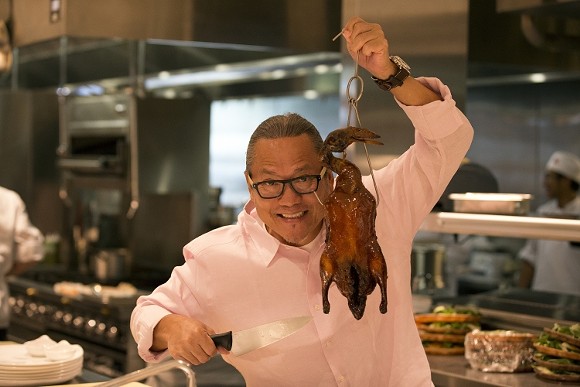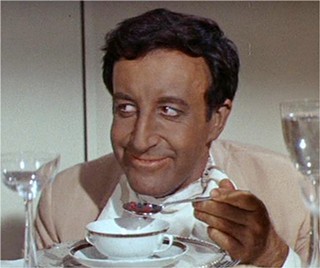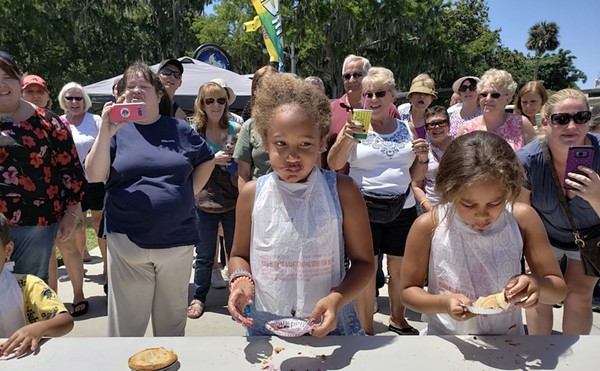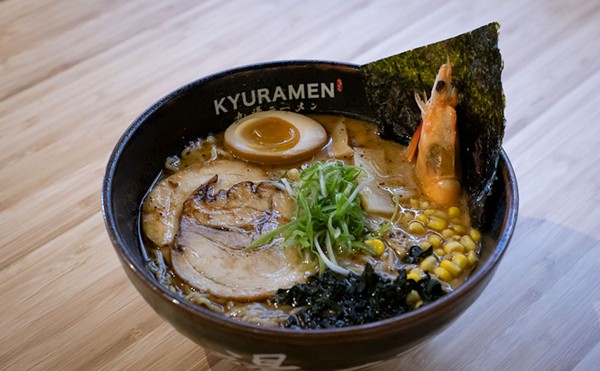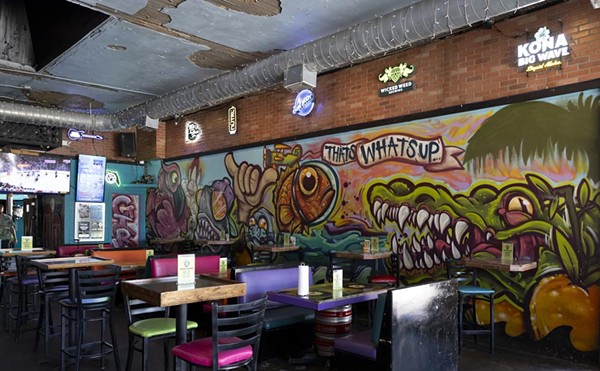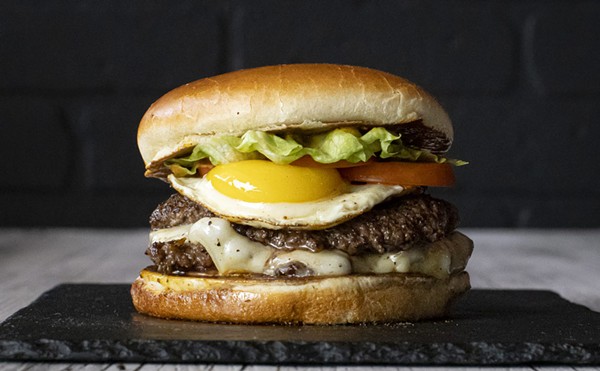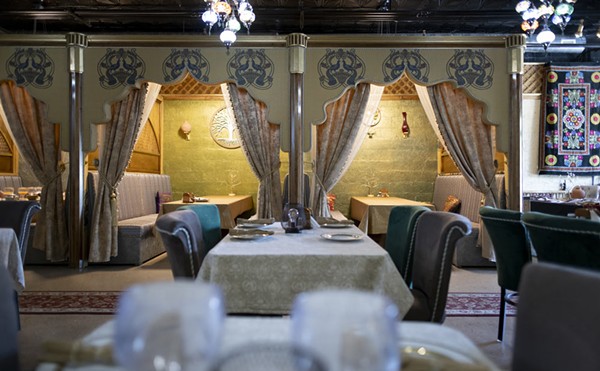On the boob tube, “Iron Chef” Masaharu Morimoto might come off seeming a little intimidating, and while there might be some truth to that – he’s a dedicated warrior with exacting skills and demanding requirements in the kitchen – he can be animated, affable and downright funny face to face. I sat down to chat with him one day over lunch at Morimoto Asia and found him to be as personable as they come. Had my Japanese been a little better than what I learned from Shōgun, we might have sat there all afternoon and into the evening just yukking it up. We talked about his latest Disney venture, fugu, monkfish injuries, eating on airplanes and, naturally, baseball.
Faiyaz Kara: An injury ended your promising professional baseball career, but what exactly drew you to cooking?
Masaharu Morimoto: When I was young, I had two dreams: to become a professional baseball player or a sushi chef. Our family’s monthly payday tradition was to go to a sushi restaurant. I always believed sushi chefs make people happy, so I wanted to do the same.
FK: What is your earliest food memory?
MM: I played sports, so I was always hungry. My memory comes not about a particular piece of delicious food; rather, just trying to get full. To me, food was all about quantity rather than quality when I was young.
FK: How did working for Nobu Matsuhisa change your perspective on cooking and running a restaurant, and what's the most valuable thing you learned from him?
MM: Before I worked at Nobu, I had thought the sushi chef was the center of the restaurant. However, working at Nobu, I learned that the customers are everything. Our job is to make them happy.
FK: Orlandoans are all too familiar with the “absentee chef.” How often will you appear in the kitchen at Morimoto Asia?
OW: I will be at Morimoto Asia as often as my busy schedule allows because I love Orlando, and my wife loves Mickey Mouse!
FK: What is your next big project or restaurant?
MM: Momosan project. The first project of Momosan is Momosan Ramen & Sake that will be open in New York City early this year. I’d love to open a restaurant in Toronto if I get a chance. The one that was announced isn’t opening.
FK: Apart from trust, what is it you look for in a partner when you open a restaurant in a different city around the world?
MM: To share the same values surrounding hospitality and an overall guest experience. Since I cannot be there all the time, if the partner also has restaurant management skills, that’s an ideal situation.
FK: Which is better? Matsusaka beef or Kobe beef?
MM: It is hard to compare. If you want to compare Harvard University and New York University, most of the people say Harvard is better. However, if you compare the top student of NYU and the bottom student of Harvard, the NYU student must be better. The same can be applied to wagyu beef. Personally I believe Japanese wagyu from all the prefectures are wonderful beef.
FK: I hear you say in many interviews that you're “getting old,” so what sort of legacy do you want to leave?
MM: I am in this business because of my passion for food and my love of cooking. I really don’t get caught up in thinking about what type of legacy I will leave when I’m done.
FK: So you’ll cook until you can’t cook no more?
MM: Yes.
FK: What do you do to escape from the celebrity spotlight and get away from it all?
MM: I don’t do anything in particular. I try not to go to crowded places. I don’t like parties anyway.
FK: You told me last time we chatted that your wife, Keiko, cooks for you at home. If there’s one dish of hers you would want everyone to try, what would it be?
MM: Vegetable dishes. Especially her root vegetable dishes.
FK: Who’s the most underrated chef working in the business today?
MM: My wife.
FK: What is your ultimate vision for Morimota Asia compared to your other restaurants?
MM: People come here to relax with the family. I want Morimoto Asia to be “comfortable.” Not every Morimoto needs to be $120 per person. We have whole Peking duck – sometimes you see restaurants charge $80, $90, $100 per person for that. We charge $48. Also, American people think of Chinese food as cheap, but still delicious and filling. But in Japan, the most expensive food is Chinese food. Most Americans don’t appreciate things like shark fin, dry abalone etc., but I want to show the people here in Disney a little bit of that, like Peking duck [Laughs].
FK: Will we ever see fugu (puffer fish) served at Morimoto Asia?
MM: No I have no plans of using fugu at Morimoto Asia.
FK: What one food trend are you most tired of?
MM: I am tired of the nature of “food trends” itself. Sushi used to be a trendy food, but no one thinks it is anymore. Good food should not be treated as trend but rather just as interesting and delicious food.
FK: What’s the worst injury you’ve sustained in the kitchen?
MM: [Laughs] When I was on Iron Chef, the original Japanese version, I was working with monkfish. I took one out of the barrel and tried to cut it and it bit me. There was a lot of blood while we were taping the show. We weren’t live. But it kept bleeding, so I wrapped a towel around my hand and tried to hide it while taping the show.
FK: What advice do you give up-and-coming sushi chefs?
MM: You can learn to make sushi from TV, the Internet, a chef you trust, or a teacher, but you also need to be a sushi chef emotionally. You need to learn why sushi started in Japan, and know the history of sushi. The "why?" and "how?" My knife is very sharp, and very expensive. I can give it to you, but you can’t make sushi. You need the proper technique – it’s also important – but the difference is having the skill in the mind, heart and body.
FK: How do you stay in such good shape?
MM: I eat one meal a day.
FK: You eat one meal a day? C’mon!
MM: Yes. Yes.
FK: When do you eat that meal?
MM: It depends on my schedule, but usually between 3 and 5 p.m. I eat a lot! I eat ramen, sauteed vegetables, a little meat or fish, and rice. In my house, my wife cooks for me, but when I’m working, only one meal a day. And I don’t eat anything on airplanes. Even when going to Japan on a 14-hour flight. Zero. Nothing. Because eating and drinking on the plane, it’s not so good. Wherever I fly – New York to Orlando or Napa – I have restaurants there, so when I land I can get the best food. After I eat [on a plane], the food sits in my belly and I can’t do anything. It’s not good.
FK: Maybe I should try that.
MM: [Looks at my belly] Maybe you should [laughs]. It’s not that I don’t like airplane food. Sometimes the airlines say, “Oh, Morimoto’s mean … he doesn’t like our food,” but it’s not that. It’s my personal decision! I don’t want to eat anything!
FK: To use a baseball term, what's the biggest error you've made cooking?
MM: I am a kind of chef who doesn’t usually make a big error. To tell you the truth, I just don’t recall if I have ever made a big error. I think every time I made a small error, I quickly handled the situation well, so that it didn’t lead to a big error.
FK: So what kind of hitter were you?
MM: I was a .300 hitter. Not too many home runs. I was a catcher [points to his head]. The thinking man. [Laughs]
Tags:

WE LOVE OUR READERS!
Since 1990, Orlando Weekly has served as the free, independent voice of Orlando, and we want to keep it that way.
Becoming an Orlando Weekly Supporter for as little as $5 a month allows us to continue offering readers access to our coverage of local news, food, nightlife, events, and culture with no paywalls.
About The Author
Faiyaz Kara
Orlando restaurant critic. Orlando Weekly restaurant critic since 2006.
Scroll to read more Food News articles
Newsletters
Join Orlando Weekly Newsletters
Subscribe now to get the latest news delivered right to your inbox.

